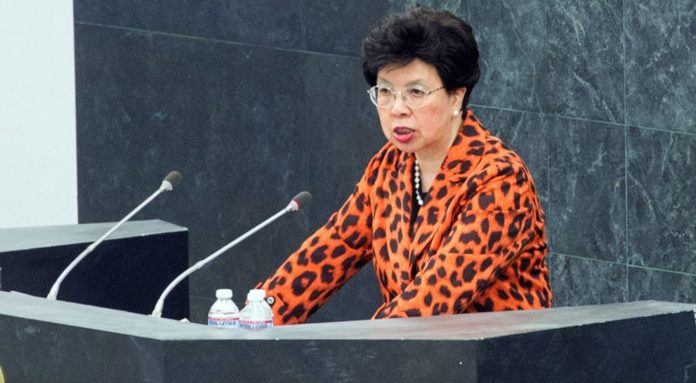
Dr. Margaret Chan, Director-General of the World Health Organization (WHO), speaks at a special Ebola response meeting on Sunday. (UN Photo/Loey Felipe)
The World Health Organization has proposed reforms that could overhaul its structure after botching the response to the largest and most complex Ebola outbreak in history, a sluggish performance that experts say cost thousands of lives.
On Sunday, several dozen of WHO’s member countries approved a resolution aimed at strengthening the U.N. health agency’s ability to respond to emergencies, though many of the details have yet to be worked out and it’s unclear what concrete changes will result.
“The WHO we have is not the WHO we need,” said Dr. Tom Frieden, director of the U.S. Centers for Disease Control and Prevention. He said decisions at WHO were often made for political rather than scientific reasons.
The WHO has faced strong criticism for its slow response and for ignoring warnings from organizations such as Doctors Without Borders about the magnitude of the Ebola outbreak in West Africa.
The deadly virus circulated for three months before the agency officially confirmed an outbreak in late March 2014 in Guinea. Even after repeated, urgent warnings from aid groups working in the Ebola-affected countries, the WHO waited until August to declare the outbreak a public health emergency of international concern. By then, West Africa was being ravaged by the worst Ebola outbreak in history.
WHO Director-General Dr. Margaret Chan acknowledged at an emergency meeting on Sunday that the agency was too slow to grasp the significance of the Ebola outbreak, which is estimated to have killed more than 8,600 people, mainly in Guinea, Liberia and Sierra Leone.
“The world, including WHO, was too slow to see what was unfolding before us. Ebola is a tragedy that has taught the world, including WHO, many lessons also about how to prevent similar events in the future. … Never again should the world be caught by surprise, unprepared,” Dr. Chan said.
She said the current rules for reporting outbreaks — the International Health Regulations (IHR), created to prevent national health emergencies from becoming global crises — are insufficient and need to be expanded and streamlined. But the biggest lesson she and others at WHO learned during the outbreak fight was that well-trained, and appropriately paid health care workers, are essential to stemming the spread of disease.
In a resolution adopted by WHO’s executive board, nearly 60 countries called on the agency to take “immediately necessary steps” to enact measures including the creation of an emergency fund to respond to health crises. Britain’s Chief Medical Officer, Dr. Sally Davies, announced the U.K. would donate $10 million to the proposed fund.
The resolution also called for the establishment of a reserve of health workers to battle epidemics. Dr. Bruce Aylward, WHO assistant director-general in charge of the Ebola response, said the agency would need about a workforce of about 1,500 for such emergencies, up from 1,000 currently. Still, the WHO conceded that, despite public expectations that it can respond quickly to health emergencies, it simply is not designed to do that.
Countries also proposed that WHO’s director-general should be able to “add or change staff with appropriate expertise at the country and regional level.” According to a previous report from the Associated Press, officials at WHO’s Geneva headquarters blamed its Africa office for botching initial efforts to contain Ebola.
“What you see here is the potential for some of the most wide-ranging and sweeping reforms in any area of WHO that we’ve seen almost since the organization was established,” said Dr. Aylward.
However, he acknowledged that country and regional offices hadn’t yet signed off on these reforms and that hammering out those details might be challenging. “A lot of this is still to be discussed, what this will actually look like,” he said.
Earlier this week, the United Nations launched an appeal for the $1 billion needed for the first six months of 2015 in order to sustain the momentum to stamp out Ebola in the three worst-affected countries. The WHO warned that without additional funding, it would run out of money to fight the virus in mid-February, adding that international pledges of financial support had plummeted as the outbreak dropped out of the headlines.
